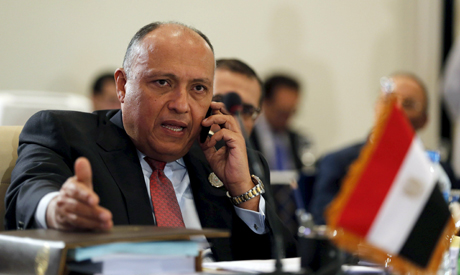
File Photo: Egypt's Foreign Minister Sameh Shoukry (Photo: Reuters)
Egypt's Foreign Minister Sameh Shoukry said that Ethiopia's ownership of its Grand Ethiopian Renaissance Dam (GERD) does not give it the right to violate legal accords signed willingly, days after the collapse of months-long Washington-mediated talks to resolve the GERD crisis.
In an exclusive interview with state TV, Shoukry said Ethiopia's ownership of the GERD does not give it the right to unilaterally control the Nile, which he described as the “lifeblood of Egypt since the dawn of time.”
Addis Ababa should acknowledge that the Nile is a river that passes through several countries with rights and interests, Shoukry said.
Shoukry's statements came a few days after Washington failed to seal signatures from Egypt, Sudan and Ethiopia on the filling and operating of the GERD, failing to reach an agreement after months of dispute over the dam project, which the three countries hoped to overcome with US mediation.
Despite the stalemate, the United States said it would remain engaged in talks with the three countries until a final agreement is signed.
Egypt, Ethiopia and Sudan were expected to sign a final deal on the disputed dam by the end of February; however, Addis Ababa said it would not take part in what was due to be the final round of talks to resolve the years-long crisis.
Only Egypt initialed the US-prepared final agreement, calling on Sudan and Ethiopia to follow suit.
The latest Washington meeting's outcome led to a tug of war between the concerned countries in the past days, with Egypt accusing Ethiopia of "deliberately" impeding the course of negotiations on the disputed Nile dam project through its boycott of the latest meetings and comments about "disappointment" with the meetings.
"One of the most dangerous aspects of the latest Ethiopian comments is an implication or a clear declaration of Ethiopia's violation [or attempted violation] of the 2015 signed Declaration of Principles," Shoukry said.
"We have repeatedly put ourselves in Ethiopia's position, and were content with the positions that we see as fair and serve the partners in Ethiopia and Sudan," he said, adding that Egypt has not received the same treatment.
Ethiopia hopes the massive $4.8 billion megaproject on the Blue Nile, which has been under construction since 2011, will allow it to become Africa’s largest power exporter.
Cairo fears the dam will diminish its water supply from the Nile, on which it relies for the vast majority of its fresh water.
Short link: